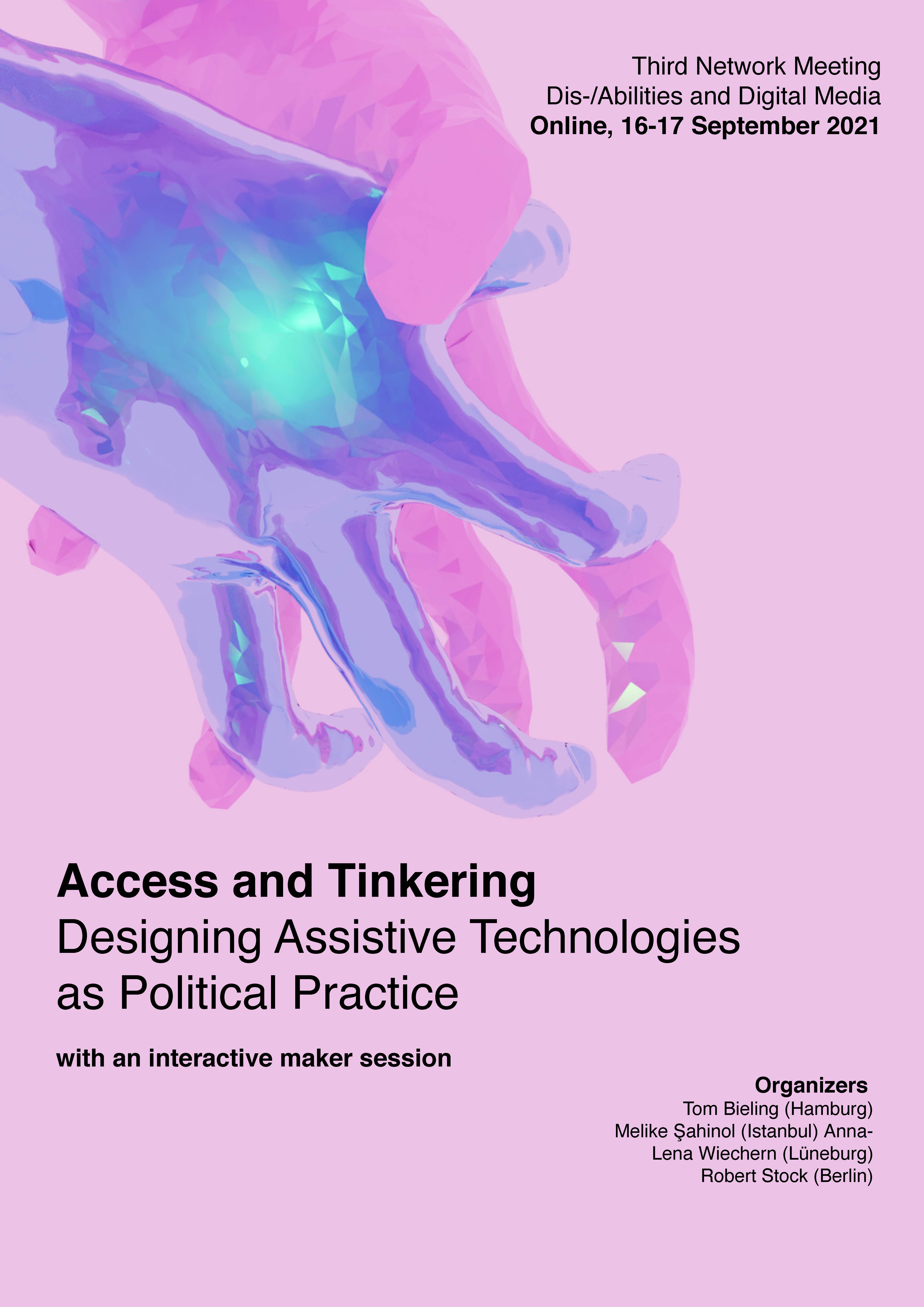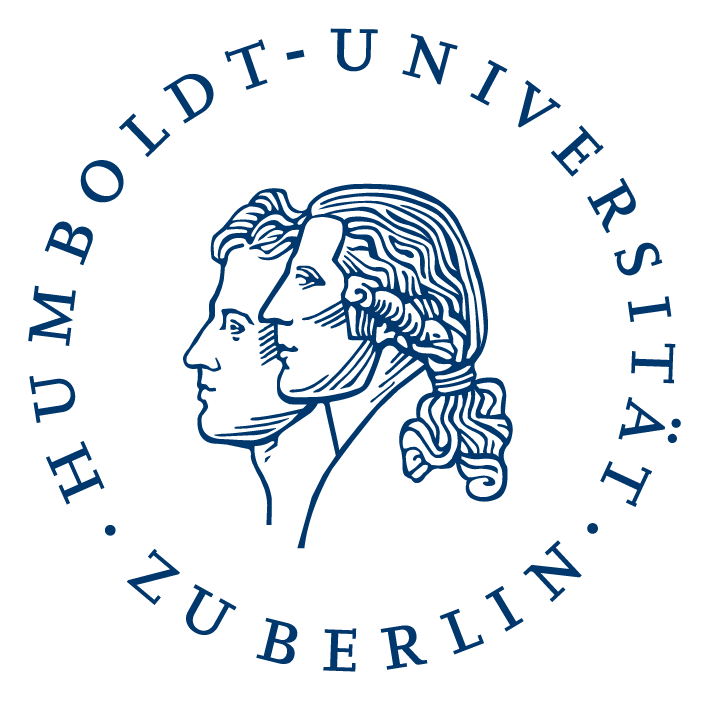with an Interactive Maker Session

Download the program as a PDF here.
Workshop
By drawing on STS, Crip Technoscience (Hamraie/Fritsch 2019) and approaches from participatory design research and practice, this event discusses body-technology relations from inter-, transdisciplinary and cross-cultural perspectives. We argue in favor of extending the concept of materiality beyond the borders of the physical object to include practices and relations and consequently, want to question common concepts of norm, normality, and normativity. Because these notions are not only entangled with artefacts but also with their design and the practices they involve, which include bodies embedded in historical, cultural, infrastructural and institutional contexts. Thus, they can be considered situated (Haraway 1988). As a result, questions and demands for inclusion and social participation, too, become virulent (Star 2017, 1999; Winner 1980) and have been problematized as politics of assistive artefacts (Mills 2012). In sum, we propose to re/frame technology and body (differences) as interacting entities within societies.
The event aims to think critically through a theoretical framework in the context of dis/abilities that recognizes assistive technologies as political as well as situated interconnections. On this basis, we endorse to reflect on infrastructures of design for questions of inclusion and participation – cross-cultural, inter- and transdisciplinary. Reflecting on open source practices in medical and assistive technologies (e.g. 3D printing) will allow us to question the effects of heterogeneous interests, economic implications and everyday affordances of socio-material assemblages produced within the frameworks of participatory design research.
Interactive Maker Session
In order to integrate body-technology relations from interdisciplinary standpoints as well as an awareness for the need for participatory design research as a policy of inclusion in social contexts, a maker session will be organized. For this purpose, hands-on kits will be sent out to participants after prior registration. The kits serve to didactically convey an understanding of how technological innovations and design issues related to body modifications or diversely enabled bodies are viewed both in terms of their effects on society and as shaped by societal norms, values, and frameworks.
Construction Manual (German only) ![]()
The number of kits is limited. If you are interested, please register by 20 August 2021.
Please contact sahinol[at]oiist.org until 10 August to receive a kit.
Accessibility
![]()
German Sign Language Interpretation will be provided during the public talks. Please make sure to bring a second device for accessing DGS interpretation (provided in a separate Zoom room).
Program parts open to the public will include automatic closed captions via Zoom.
Keynotes and presentation open to the public will have subtitles (manual). The respective information will be provided during the talks.
Please let us know about any further accessibility requirements by 15 August 2021 by emailing robert.stock[at]hu-berlin.de
Registration
Please sign up through the Zoom registration page linked below to receive access to the public discussion, maker session and keynotes: Click here.
Organized by
Tom Bieling (Hamburg), Melike Şahinol (Istanbul), Anna-Lena Wiechern (Lüneburg), Robert Stock (Berlin)
PROGRAM
Thursday, 16 September 2021
All times are CEST
9:00-am12:00pm
Internal Network Meeting
1:30pm-3:30pm
Maker Session
Assembling 3D-printed prosthetic dummy “Phoenix Hand”
Lars Thalmann, e-nable Germany
[Registration necessary]
Operating Manual (German only) ![]()
04:00pm–05:30pm
![]()
Roundtable Discussion
[open to public]
“DIY-Prostheses, Toys and Remote-Prototyping”
Lars Thalmann, e-nable Germany
Thomas Miebach (Interface Designer) and Daniel Wessolek (Tangible Interaction Designer, Berlin)
Zeynep Karagöz (ROBOTEL/ e-nable, promaker)
Chair: Melike Şahinol
07:00pm–08:30pm
Keynote I
[open to public]![]()
Assoc Prof Aimi Hamraie, PhD (Vanderbilt University)
“Crip Making”
Chair: Tom Bieling
Friday, 17 September 2021
9:00am-12:00pm
Internal Network Meeting
1:30pm-3:00pm
![]()
Presentation
[open to public]
Tomás Sánchez Criado, PhD (Humboldt University)
“The Pharmakon of Collaboration: Activating Research with the Independent Living Forum”
Chair: Anna-Lena Wiechern
3:30pm-5:00pm
![]()
Keynote II
[open to public]
Prof Dr Anne Waldschmidt (University of Cologne)
“Inclusion – Accessibility – Normality: Some Remarks from a Dispositif-Analytical Perspective””
Chair: Robert Stock
Guest Speakers
Dr. Tomás Sanchez Criado (Humboldt University) is Senior Researcher at the Chair of Urban Anthropology, Director of the Stadtlabor for multimodal anthropology of Humboldt-University of Berlin’s Institute of European Ethnology and Academic Coordinator of the Erasmus+ office of our institute. Research interests are at the crossroads of Anthropology and STS, developing ethnographic and public engagement work around urban knowledge and material politics in a wide variety of settings where care is invoked as a domain or a particular mode of design intervention such as independent-living services or technologies, accessibility infrastructures.
Assoc Prof Aimi Hamraie, PhD (Vanderbilt University) (they/them) is Associate Professor of Medicine, Health, & Society and American Studies at Vanderbilt University, and director of the Critical Design Lab. Hamraie is author of Building Access: Universal Design and the Politics of Disability (2017) and host of the Contra* podcast on disability, design justice, and the lifeworld. They identify as disabled, SWANA, and diasporic Iranian. Their interdisciplinary research spans critical disability studies, science and technology studies, critical design and urbanism, critical race theory, and the environmental humanities. Website: https://aimihamraie.wordpress.com/.
Zeynep Karagöz (Robotel Türkiye) graduated from MSÜ – Architecture and co-founded KOMA Architecture in 2001. With Robotel Türkiye, she started making 3D printed mechanical hands for children with hand deformation who do not have access to prosthetics. In 2017, Robotel became an NGO. Karagöz makes programs on 21.Century & technology skills with Maker Çocuk & Maker Atölye. She designs collaborative multidimensional &multidisciplinary projects. She also shares her expertise as a speaker, trainer & mentor. Defining herself as a PROMAKER she is addicted to civil society & social entrepreneurship.
Thomas Miebach (Project "Dialogstarter") (Berlin) is a native signer and grew up in the Deaf community. He studied interface design study at the Fachhochschule Potsdam and was a board member of the Berlin association of the deaf youth “jubel3”. He has been a freelancer as a Digital Media Designer for diverse deaf organizations and deaf associations for many years and participated in workshops organized by Careables or MatchMyMaker like the Open Health HACKademy. With Daniel Wessolek he started the project Dialogstarter and aims to create interactive tools for both deaf and hearing people.
Lars Thalmann (e-Nable, Germany) is an e-Nable Ambassador in Germany. A certified engineer for mechanical engineering from the Robert Bosch Berufskolleg Engineering in Duisburg with professional experience in CAD, he earned his Bachelor for Machine Engineering at the F.O.M and University of applied sciences Bochum (2017) with a thesis about the material analysis of a 3D Printed e-Nable Phoenix hand. He finished his master at the Technical University of Applied Sciences Bochum with a thesis about the full knee joint analysis of the 3D Printed leg from GiveMe5 south America (Columbia), a leg designed for Kids up to 10 years.
Daniel Wessolek (Berlin) works in the field of open hardware, personal fabrication, and co-design processes. He is the lead for the EU-funded project OPENNEXT for Prototypes for Europe e.V. and recently joined the Open Knowledge Foundation Germany to work on a Prototype Fund for Hardware. Previously he was a co-lead for Careables, helped set up the Futurium Lab in a Museum for desirable Futures in Berlin, and has been a postdoctoral research fellow at Singapore University for Technology and Design (SUTD) where he worked on SwimSight, a visual start signal indicator for deaf competitive swimmers. With Thomas Miebach he works on Dialogstarter, a project to bring deaf and hearing people together.
Prof. Dr. Anne Waldschmidt (University of Cologne) is Professor of Sociology and Politics of Rehabilitation, Disability Studies and Director of iDiS – International research unit Disability Studies, Member of the Department of Special Education and Rehabilitation at the Faculty of Human Sciences, University of Cologne, Germany. Her research focuses on sociological aspects of human genetics and reproductive technologies; bio-politics and autonomy; normality, deviance, and disability; political participation, self-help organisations, and disability movements; health and social policy; disability policy in Europe and internationally; the sociology of knowledge; sociology of the body; gender studies, diversity studies; discourse analysis and qualitative empirical research. Professor Waldschmidt has written and edited several important books and regularly publishes in international peer-reviewed journals. More details about her work, research and publications: https://orcid.org/0000-0002-7371-3031.




